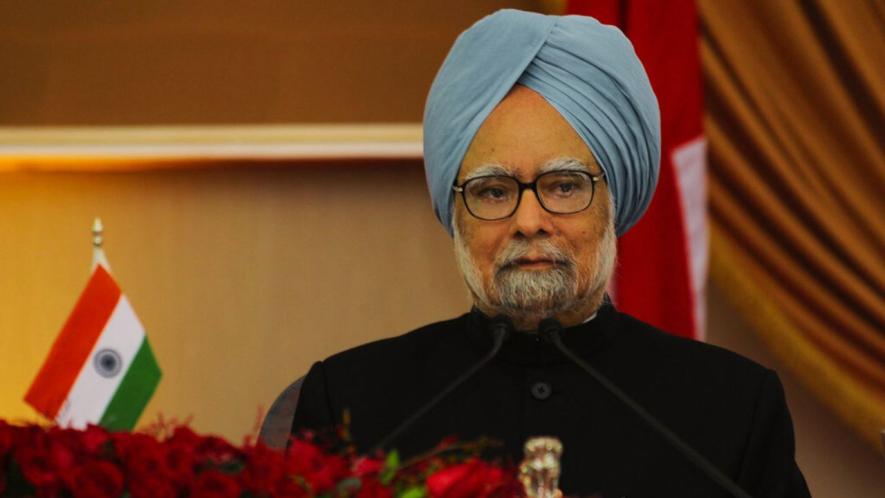How Kind Should History be to Manmohan Singh’s Political Life?

Image Courtesy: Flickr
People have started sharing images of former Prime Minister Manmohan Singh after his demise with his quote "History will be kinder to me than the contemporary media." We must not speak ill of the dead, however, it is necessary to critically engage with the politics Singh practiced and the policies that were implemented in his tenures as Finance Minister and Prime Minister.
Singh was among the chief architects of the neoliberal turn in India. He was the Finance Minister under Prime Minister Narasimha Rao, from 1991-96, and during this tenure he went about taking a cudgel on the dirigiste economy. The policies adopted were along the lines of the structural adjustment policies that were implemented under the guidance of the International Monetary Fund across the Global South.
There was economic liberalisation with the opening up of the capital markets allowing the flow of foreign investment into the country. There was also the beginning of the policy of large-scale disinvestment and privatisation of the public sector companies and their declining share in the economy of the country.
Along with this, there was a shift in the focus of India's development needs from the rural and agrarian spheres. Agriculture no longer was seen as the priority sector which should be the focus of government support and investment.
Along with this, there were continuous steps at nibbling away at the public procurement and distribution system. Credit flowing from the public sector banks to the hands of farmers also began declining during this period. Credit in agriculture was focused toward the emerging agribusiness sector. This went in contrast to the logic of nationalisation of banks, which was itself done to ensure flow of credit to rural areas and hands of farmers. This was the period when the large-scale indebtedness of farmers became an issue.
Agriculture was also opened up to the international markets, which resulted in diversion of cultivation from foodgrain to various crops in demand, such as cotton. There was, hence, a fall in per capita output and a decline in foodgrian absorption. The 1990s were the decade when starvation, hunger and farmers suicides became a major issue in the country.
Singh also did not become the Prime Minister “accidentally”, as the title of the book by his media advisor Sanjaya Baru hints. He was made the Prime Minister precisely because he was the architect of the neoliberal reforms. It was because he was the man who had the confidence of the big bourgeoisie of the country, along with international institutions, such as IMF, which are the representatives of international finance capital. It was because they knew he was “their man” and that as long as he was at the helm, the neoliberal reforms would continue with stability.
While there is no question of his personal secular credentials and decency as a human being and political leader, Singh cannot be given a clean chit for the events that have transpired since his tenure either. It was his policies and his tenure as Prime Minister that laid the foundation for the present dispensation.
The continued implementation of neoliberal policies built up economic inequality to ever increasing levels. At the same time, these policies also strengthened the big bourgeoisie, and especially new elements within this big bourgeoisie who were able to rise because of the withdrawal of the public sector and new spaces provided in various sectors from petrochemicals to infrastructure – Ambanis and Adanis, for example.
It is these same corporates who saw the Bharatiya Janata Party (BJP) as a better representative to be able to tackle the possible problems that could arise from the rising inequality through the diversion provided by their anti-minority Hindutva politics. Hence, the neoliberal policies that Singh piloted created the basis for the corporate-Hindutva nexus on the basis of which the BJP came to power, defeating Singh and his Congress party.
While we must not speak ill of the dead, we must also not whitewash history. We must certainly celebrate Singh’s contributions to the country and also fondly remember his time as Prime Minister when he was open to questioning by the press and the public as well as allowing a certain space for dissent and criticism which has since disappeared.
Singh was certainly a democrat with strong secular credentials. However, we must also critically evaluate the policies that he piloted and understand their consequences to evolve the politics to overcome the current conjuncture.
The writer is a Research Scholar in Jawaharlal Nehru University, Delhi. The views are personal.
Get the latest reports & analysis with people's perspective on Protests, movements & deep analytical videos, discussions of the current affairs in your Telegram app. Subscribe to NewsClick's Telegram channel & get Real-Time updates on stories, as they get published on our website.























